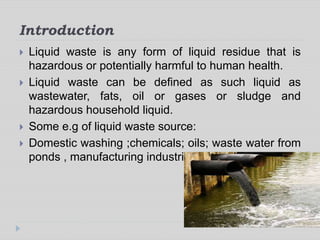The Single Strategy To Use For Reclaim Waste
Table of ContentsThe 9-Second Trick For Reclaim WasteLittle Known Questions About Reclaim Waste.Some Known Questions About Reclaim Waste.Our Reclaim Waste IdeasReclaim Waste Things To Know Before You Get This
Discover the kinds, occurrences, and kinds of liquid waste. Residential sewage waste describes the waste and items from a household sewage-disposal tank. This sort of waste is developed by people in houses, colleges, and other structures. This only includes sewage-disposal tanks that have a drain area. The appropriate management and disposal of residential sewage waste call for liquid waste to be moved to a sewer treatment plant where the proper approaches and devices are related to purify and get rid of waste.
Industrial waste usually includes prospective threats, such as flammable materials or a blend of fluid and strong waste products, and requires a much more innovative and comprehensive disposal process. The disposal of business waste commonly involves the filtration of waste before transport to make certain safe and proper disposal. Industrial waste is developed from byproducts and runoff of industrial processes and manufacturing.
This sort of waste can not make use of the very same sewer monitoring transport or processes as septic or commercial liquids. The industrial waste management process requires the inspection and testing of liquid waste before it undergoes the disposal process (liquid waste removal). Overflow waste is the liquid waste that comes from runoff and excess stormwater in highly populated locations or cities
Overflow waste can trigger contamination and flooding if not managed appropriately. Discover much more concerning sewer cleaning and waste management. Ensuring correct waste monitoring can protect against calamities and minimize environmental harm. Both people in household settings and professionals in commercial or manufacturing markets can take advantage of recognizing the procedures and policies of liquid waste management.
Everything about Reclaim Waste
Contact PROS Providers today to discover our waste administration and disposal solutions and the appropriate means to care for the fluid waste you create.
(https://www.metal-archives.com/users/reclaimwaste1)This so-called 'wastewater' is not just a vital source yet, after treatment, will certainly be launched to our land, waterways or the sea. Used water from bathrooms, showers, bathrooms, kitchen sinks, laundries and commercial processes is understood as wastewater.

water used to cool equipment or tidy plant and equipment). Stormwater, a kind of wastewater, is runoff that flows from farming and urban locations such as roofing systems, parks, yards, roadways, paths and rain gutters right into stormwater drains pipes, after rainfall. Stormwater flows unattended directly to local creeks or rivers, ultimately getting to the sea.
The 10-Minute Rule for Reclaim Waste
In Queensland, the majority of wastewater is dealt with at sewer therapy plants. find more information Wastewater is transferred from domestic or industrial websites via a system of sewage systems and pump terminals, called sewage reticulation, to a sewage therapy plant. Regional federal governments develop, maintain and run most sewer treatment plants. Operators are licensed under the Environmental Protection Act 1994 to discharge cured wastewater at an appropriate ecological requirement into waterways.
The Department of Natural Resources encourages city governments regarding managing, operating and maintaining sewage systems and therapy plants. In unsewered areas, local federal governments may require owners to mount private or household sewer treatment systems to treat residential wastewater from bathrooms, kitchens, washrooms and washings. The Department of Natural Resources authorizes making use of house systems when they are verified to be efficient.
Most stormwater obtains no treatment. In some brand-new class, treatment of some stormwater to get rid of trash, sand and crushed rock has begun utilizing gross pollutant catches. Wastewater treatment takes place in 4 stages: Removes strong issue. Larger solids, such as plastics and various other items wrongly discharged to sewers, are gotten rid of when wastewater is travelled through displays.
Utilizes little living microorganisms knows as micro-organisms to break down and eliminate staying liquified wastes and great fragments. Micro-organisms and wastes are incorporated in the sludge.
Top Guidelines Of Reclaim Waste
Nutrient removal is not available at all sewage therapy plants due to the fact that it needs costly specialised equipment. Clear liquid effluent generated after therapy might still have disease-causing micro-organisms - liquid waste disposal.

The majority of wastewater streams right into the sewerage system. Under the Act, neighborhood governments provide approvals and licences for environmentally appropriate tasks (Ages) entailing wastewater releases that may have a local effect.
A Biased View of Reclaim Waste
Tracking provides valid information about water quality and can confirm that permit problems are being fulfilled. The details gotten through tracking provides the basis for making water high quality choices.